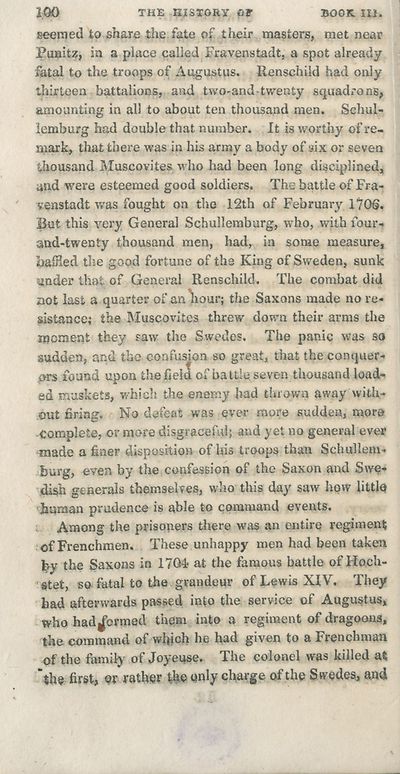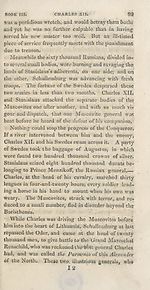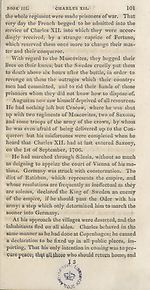Download files
Complete book:
Individual page:
Thumbnail gallery: Grid view | List view

BOOK. IU.
100 THE HISTORY Of
seemed to share the fate of their masters, met near
Punitz, in a place called Fravenstadt, a spot already
fatal to the troops of Augustus. Renschild had only
thirteen battalions, and two-and-twenty squadrons,
amounting in all to about ten thousand men. Schul-
lemburg had double that number. It is worthy of re¬
mark, that there was in his army a body of six or seven
thousand Muscovites who had been long disciplined,
and were esteemed good soldiers. The battle of Fra¬
venstadt was fought on the 12th of February 1706.
But this very General Schullemburg, who, with four-
and-twenty thousand men, had, in some measure,
bafHed the good fortune of the King of Sweden, sunk
under that of General Renschild. The combat did
not last a quarter of an'hour; the Saxons made no re¬
sistance; the Muscovites threw down their arms the
moment they saw the Swedes. The panic was so
sudden, and the confusion so great, that the conquer¬
ors found upon the hell of battle seven thousand load¬
ed muskets, which the enemy had thrown away with¬
out firing. No defeat was ever more sudden, more
complete, or more disgraceful; and yet no general ever
made a finer disposition of his troops than Sclmllem-
burg, even by the confession of the Saxon and Swe¬
dish generals themselves, who this day saw how little
human prudence is able to command events.
Among the prisoners there was an entire regiment
of Frenchmen. These unhappy men had been taken
by the Saxons in 1704; at the famous battle of Hoch-
stet, so fatal to the grandeur of Lewis XIV. They
had afterwards passed into the service of Augustus,
who had^brmed them into a regiment of dragoons,
the command of which he had given to a Frenchman
of the family of Joyeuse. The colonel was killed at
“the first, or rather the only charge of the Swedes, and
100 THE HISTORY Of
seemed to share the fate of their masters, met near
Punitz, in a place called Fravenstadt, a spot already
fatal to the troops of Augustus. Renschild had only
thirteen battalions, and two-and-twenty squadrons,
amounting in all to about ten thousand men. Schul-
lemburg had double that number. It is worthy of re¬
mark, that there was in his army a body of six or seven
thousand Muscovites who had been long disciplined,
and were esteemed good soldiers. The battle of Fra¬
venstadt was fought on the 12th of February 1706.
But this very General Schullemburg, who, with four-
and-twenty thousand men, had, in some measure,
bafHed the good fortune of the King of Sweden, sunk
under that of General Renschild. The combat did
not last a quarter of an'hour; the Saxons made no re¬
sistance; the Muscovites threw down their arms the
moment they saw the Swedes. The panic was so
sudden, and the confusion so great, that the conquer¬
ors found upon the hell of battle seven thousand load¬
ed muskets, which the enemy had thrown away with¬
out firing. No defeat was ever more sudden, more
complete, or more disgraceful; and yet no general ever
made a finer disposition of his troops than Sclmllem-
burg, even by the confession of the Saxon and Swe¬
dish generals themselves, who this day saw how little
human prudence is able to command events.
Among the prisoners there was an entire regiment
of Frenchmen. These unhappy men had been taken
by the Saxons in 1704; at the famous battle of Hoch-
stet, so fatal to the grandeur of Lewis XIV. They
had afterwards passed into the service of Augustus,
who had^brmed them into a regiment of dragoons,
the command of which he had given to a Frenchman
of the family of Joyeuse. The colonel was killed at
“the first, or rather the only charge of the Swedes, and
Set display mode to:
![]() Universal Viewer |
Universal Viewer | ![]() Mirador |
Large image | Transcription
Mirador |
Large image | Transcription
| Antiquarian books of Scotland > Kings & rulers > History of Charles XII, King of Sweden > (118) |
|---|
| Permanent URL | https://digital.nls.uk/115022426 |
|---|
| Description | Thousands of printed books from the Antiquarian Books of Scotland collection which dates from 1641 to the 1980s. The collection consists of 14,800 books which were published in Scotland or have a Scottish connection, e.g. through the author, printer or owner. Subjects covered include sport, education, diseases, adventure, occupations, Jacobites, politics and religion. Among the 29 languages represented are English, Gaelic, Italian, French, Russian and Swedish. |
|---|

